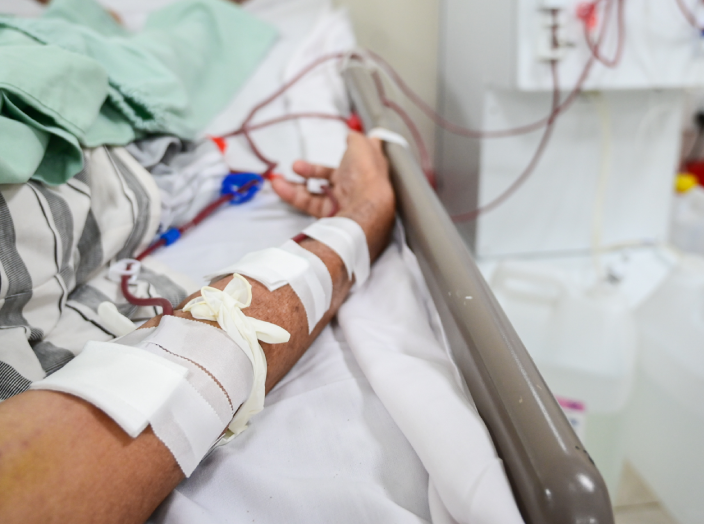Dialysis patients
Kidney failure in your twenties
NVD (23 years old, a university student in Hanoi ) used to live like many other young people: staying up late to study for exams, eating late, drinking bubble tea and soft drinks. The young man never imagined that this seemingly normal lifestyle would lead to a heavy price: lifelong dialysis.
D. discovered he had stage IV chronic kidney disease last year, but because he was busy with his university graduation exams, he neglected his health, didn't have regular check-ups, and even stopped taking his medication.
It wasn't until he was exhausted and experiencing severe nausea that D. returned to the hospital. The doctor delivered the bad news: his kidney function had deteriorated drastically, he had end-stage renal failure, and he needed dialysis immediately.
Since then, to survive, D. has had to undergo dialysis three times a week at Hanoi Medical University Hospital. Lying in her hospital bed, watching the needle pierce her skin to filter her blood, D. couldn't help but feel regret and nostalgia for her lost youth.
“Staying up until 2 or 3 in the morning to study for exams, then eating late-night snacks and drinking bubble tea, I didn't think it was anything serious. If I could go back, I would take better care of myself, but now it's too late,” D. said.
According to Associate Professor Do Gia Tuyen, Department of Nephrology and Urology, Hanoi Medical University Hospital, he receives up to 6 patients with stage 4-5 chronic kidney disease each week, mostly young or middle-aged people under 45 years old. Worryingly, most patients only discover the disease when it is already in an advanced stage, when conservative treatment methods are almost ineffective.
Why are kidney failure patients often diagnosed late?
Associate Professor Tuyen pointed out three main groups of causes leading to this situation:
Lack of understanding and subjectivity
Chronic kidney disease progresses silently, with no obvious symptoms for many years. Only when signs such as edema, decreased urination, fatigue, and high blood pressure appear do patients seek medical attention, by which time the disease is already in its late stages. Many people, especially young people, are unaware of the severity of the disease, leading them to ignore the initial signs.
Lack of regular screenings
Regular kidney function tests are essential, especially for high-risk individuals such as those with diabetes, hypertension, those over 60, and those with a family history of kidney disease. Annual urine tests (measuring proteinuria) and blood creatinine levels can detect the disease early. However, many people do not undergo these tests due to a lack of information or a subjective view.
Hesitation and cost
Many people worry about the cost of medical treatment or fear discovering a serious illness, leading them to delay seeking medical attention. This causes the disease to progress silently, and by the time it's discovered, it's often too late.
The silent disease
Chronic kidney disease is often referred to as a "silent killer." With no pain, fever, or blood in the urine, it's easily overlooked. Early diagnosis requires specialized tests such as blood creatinine or urinary albumin levels, rather than relying solely on symptoms.
To reduce the risk of chronic kidney disease, Associate Professor Tuyen recommends implementing the following solutions:
- Regular screening: High-risk groups (people over 60, those with diabetes, hypertension, obesity, or a family history of kidney disease) should have their kidney function checked annually. Simple tests such as a rapid urine albumin test or blood creatinine measurement can detect the disease early. If symptoms such as frequent nighttime urination, leg swelling, or unusual fatigue occur, seek medical attention immediately.
- Strengthening primary healthcare capacity: It is necessary to train doctors at the district and commune levels on how to recognize chronic kidney disease early and provide counseling skills to slow disease progression. This will help people access healthcare services sooner, especially in remote areas.
- For people over 40 or with underlying conditions such as diabetes or hypertension, have your kidney function checked at least annually. Avoid overuse of painkillers or unproven herbal remedies. Drinking enough water, controlling your weight, and quitting smoking are effective ways to prevent the disease.
HA (according to Vietnamnet)
Source: https://baohaiduong.vn/hong-than-o-tuoi-23-414916.html






































































































![OCOP during Tet season: [Part 3] Ultra-thin rice paper takes off.](/_next/image?url=https%3A%2F%2Fvphoto.vietnam.vn%2Fthumb%2F402x226%2Fvietnam%2Fresource%2FIMAGE%2F2026%2F01%2F28%2F1769562783429_004-194121_651-081010.jpeg&w=3840&q=75)







Comment (0)